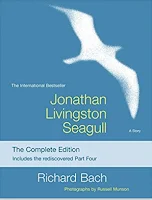"Jonathan Livingston Seagull" by Richard Bach - A Purposeful Exile
The idea that we can do anything we'd like to as long as we try hard and apply ourselves, while cheerful, is rather unrealistic in its appraisal of modern human life. As it turns out, the overwhelming majority of us have various responsibilities, not to mention innate abilities as well as deficiencies.
Pursuing one's passion often takes an incredible amount of dedication, patience, and most importantly, sacrifice... something illustrated rather acutely in Richard Bach's timeless classic, Jonathan Livingston Seagull, which was recently published once again with a new, fourth part added to it, one that Bach decided to finish only recently.
To give a basic overview of the plot, we are presented with Livingston, a seagull who isn't quite satisfied with the life set before him. The constant squabbles and bickering over food push him to see the emptiness material possessions bring, and his focus slowly shifts to his great passion: flight. Though he gets better and better at it, the other seagulls begin to shun him for the different path he walks, eventually exiling him from their society.
Undeterred by this turn of events, Livingston adamantly pursues his great dream, and eventually makes the acquaintance of other outcasts like himself who devoted their lives to the secret of flight.
With the help of an enlightened mentor, Jonathan soars to new heights and acquires powers untold, eventually prompting him to return to his former world and spread the word through his own teachings.
At first glance, it appears to be a rather rudimentary story that teaches the sorts of basic ideas most of us can arrive to on our own. However, as you get more and more engrossed into the few short chapters comprising this novella, it becomes increasingly obvious that there is much more depth to be found than a message about following one's dreams. Bach attempts to create a parallel with our own human lives and show them through the eyes of those seagulls.
He discusses a large number of pertinent existential themes, such as the understanding of one's ambitions as well as those of others, how they drive us towards our true identities, the importance of staying loyal to them, how love and forgiveness always precede personal freedom from the pressure to obey others' rules.
Though it is understandable how certain people could see this book as being more of a shallow nature (as did Roger Ebert, for instance) for its lack of profound analysis and reflection of human psychology, it certainly doesn't take away from the power of its message to inspire and motivate our internal volcanoes of personal passions.
This is the kind of story that will resonate for a long time to come with anyone but the most cynical of readers, and I highly recommend it to anyone with a bit of time to spare and ambitions to ignite.
Pursuing one's passion often takes an incredible amount of dedication, patience, and most importantly, sacrifice... something illustrated rather acutely in Richard Bach's timeless classic, Jonathan Livingston Seagull, which was recently published once again with a new, fourth part added to it, one that Bach decided to finish only recently.
To give a basic overview of the plot, we are presented with Livingston, a seagull who isn't quite satisfied with the life set before him. The constant squabbles and bickering over food push him to see the emptiness material possessions bring, and his focus slowly shifts to his great passion: flight. Though he gets better and better at it, the other seagulls begin to shun him for the different path he walks, eventually exiling him from their society.
Undeterred by this turn of events, Livingston adamantly pursues his great dream, and eventually makes the acquaintance of other outcasts like himself who devoted their lives to the secret of flight.
With the help of an enlightened mentor, Jonathan soars to new heights and acquires powers untold, eventually prompting him to return to his former world and spread the word through his own teachings.
At first glance, it appears to be a rather rudimentary story that teaches the sorts of basic ideas most of us can arrive to on our own. However, as you get more and more engrossed into the few short chapters comprising this novella, it becomes increasingly obvious that there is much more depth to be found than a message about following one's dreams. Bach attempts to create a parallel with our own human lives and show them through the eyes of those seagulls.
He discusses a large number of pertinent existential themes, such as the understanding of one's ambitions as well as those of others, how they drive us towards our true identities, the importance of staying loyal to them, how love and forgiveness always precede personal freedom from the pressure to obey others' rules.
Though it is understandable how certain people could see this book as being more of a shallow nature (as did Roger Ebert, for instance) for its lack of profound analysis and reflection of human psychology, it certainly doesn't take away from the power of its message to inspire and motivate our internal volcanoes of personal passions.
This is the kind of story that will resonate for a long time to come with anyone but the most cynical of readers, and I highly recommend it to anyone with a bit of time to spare and ambitions to ignite.
 | Richard BachPersonal site Richard Bach is an American author who is best-known for his 1970s bestsellers, Jonathan Livingston Seagull and Illusions: The Adventures of a Reluctant Messiah. He also had a career as an aviator in the United States Navy Reserve as well as in the New Jersey Air National Guard. |








Comments
Post a Comment